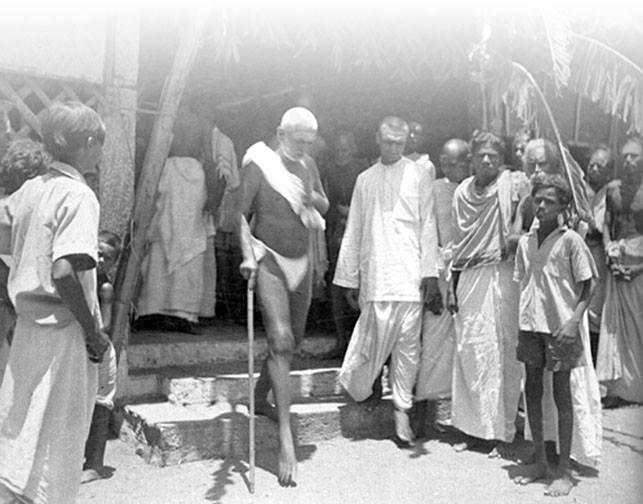698 - Swami Bhoomananda Tirtha
=========================================================================
Wednesday, March 01, 2023. 06:00.
Bhagavad Gita on death and life :
=========================================================================
Krishna effectively imparts to Arjuna the understanding that death is but a transition, not an extinction.
With this right perspective, Arjuna drops all considerations of death.
He then starts enquiring about life itself, with all its undulations. Krishna’s answer to Arjuna’s enquiry is one that Swamiji has been exposing tirelessly for the past 65 years from innumerable platforms across the world.
Before going into Krishna’s analysis, Swamiji challenges us with a question, “What is your life?” – something most have never thought about.
Considering the amount of time and energy we spend studying and analyzing the subjects we require for our professional life, it is unthinkable that we spend no time at all probing and analyzing our life itself!
Swamiji then launches into Sri Krishna’s summary of the whole life with slokam - 2.14
Slokam-2-14.
"matra-sparshas tu kaunteya shitoshna-sukha-duhkha-dah
agamapayino ’nityas tans-titikshasva bharata."
Translation :
BG 2.14: O son of Kunti, the contact between the senses and the sense objects gives rise to fleeting perceptions of happiness and distress. These are non-permanent, and come and go like the winter and summer seasons. O descendent of Bharat, one must learn to tolerate them without being disturbed.
Bhashyam (Vyakyanam) :
The human body houses five senses—the senses of sight, smell, taste, touch, and hearing—and these, in contact with their objects of perception, give rise to sensations of happiness and distress. None of these sensations is permanent. They come and go like the changing seasons. Although cool water provides pleasure in the summer, the same water gives distress in the winter. Thus, both the perceptions of happiness and distress experienced through the senses are transitory. If we permit ourselves to be affected by them, we will sway like a pendulum from side to side. A person of discrimination should practice to tolerate both the feelings of happiness and distress without being disturbed by them.
The technique of Vipassanā, which is the primary technique of self-realization in Buddhism, is based on this principle of tolerance of sense perceptions. Its practice helps eliminate desire, which, as stated in the four noble truths (the truth of suffering, the truth of the origin of suffering, the truth of the cessation of suffering, and the truth of the path leading to the cessation), is the cause of all suffering. This is not surprising considering that Buddhist philosophy is a subset of the vast Vedic philosophy.
Therefore, we do not need to worry about their coming and going. We simply have to go on doing whatever we are doing, knowing that the inevitable impacts will come in the way of either a sukha or a duhkha.
These sukhas and dukhas are all transitory, they have no power to last at all. What need have we for anything that does not last?
Therefore all we have to do is, simply forebear them. Forebear them by evaluating them with an enlightened intelligence.
The question then naturally arises – HOW do we forebear these sukha-duhkhas?
The answer is in Slokam – 2.15
Slokam -2.15.
"yam hi na vyathayantyete purusham purusharshabha
sama-duhkha-sukham dhiram so ’mritatvaya kalpate."
Translation :
BG 2.15: O Arjun, noblest amongst men, that person who is not affected by happiness and distress, and remains steady in both, becomes eligible for liberation.
Bhashyam (Vyakyanam) :
In the previous slokam, Shree Krishna explained that both the sensations of happiness and distress are fleeting. He now encourages Arjun to rise above these dualities through discrimination. In order to develop this discrimination, we first need to understand the answers to two important questions: 1) Why do we aspire for happiness? 2) Why doesn’t material happiness satisfy us?
The answer to the first question is very simple. God is an ocean of infinite bliss, and we souls are his tiny parts. This basically means that we are tiny fragments of an infinite ocean of bliss. Swami Vivekananda would address people by saying, “O ye children of immortal bliss.” Just as a child is drawn to his or her mother, each part is naturally drawn toward its whole. Similarly, being infinitesimal parts of the ocean of bliss, we souls too are drawn to this bliss. Hence, everything we do in the world is for the sake of happiness. We all may have different views regarding where happiness lies or what form it might take, but all living beings seek nothing apart from it. This answers the first question.
Now, let’s understand the answer to the second question. The soul, being a tiny part of God, is divine in nature like God himself. Hence the happiness that the soul seeks is also divine. Such happiness must possess the following three characteristics:
It must be infinite in extent.
It must be permanent.
It must be ever-fresh.
Such is the happiness of God, which is described as sat-chit-ānand, or eternal-sentient-ocean of bliss. However, the happiness we experience from the contact of the senses with their objects is the reverse; it is temporary, finite, and insentient. Thus, the material happiness that we perceive through the body can never satisfy the divine soul.
With this discrimination, we must practice to tolerate the perception of material happiness. Similarly, we must tolerate the sensation of material distress. (This second aspect is discussed in detail in many future verses, such as 2.48, 5.20, etc.) Only then will we rise above these dualities and the material energy will no longer bind us.
Ultimately, Swamiji says, this is the key that Krishna provides for our life – the whole world with its infinite variety bestow only sukha-duhkhas in our mind.
When we are equanimous to them in our mind, we have won over the entire world.
VIDEO : DISPELLING DEATH, LIVING LIFE
*****
========================================================================








Comments
Post a Comment